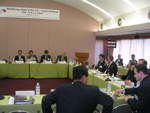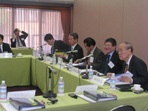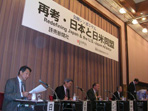Redefining Japan-US Alliance: Roundtable and Symposium Summary
Takahiro MIYAO (Professor, GLOCOM and Head, Japanese Institute of Global Communications)
| Redefining Japan & the U.S.-Japan Alliance |
| Roundtable Conference |
| Date/Time: | November 4 (T) – 5 (W), 2003 |
| Place: | The International House of Japan |
| Program: |
| Introduction:
John Wheeler (Vice President, Japan Society)
|
| Opening Remarks:
Hideya Taida (Executive Director, The Japan Foundation Center for Global Partnership)
Motoo Kaji (Chairman, The International House of Japan)
|
| Session I: New Currents in Japanese National Identity |
Moderator:
Yoichi Funabashi (Senior Staff Writer, Asahi Shimbun) |
Paper writers:
Akihiko Tanaka (Professor, University of Tokyo)
Kazuya Fukuda (Professor, Keio University Fujisawa Campus)
|
| Session II: Implications of America's New Foreign Policy Agenda on U.S.-Japan Relations |
Moderator:
Ronald Brownstein (Correspondent, Los Angeles Times) |
Paper writers:
Max Boot (Senior Fellow, Council on Foreign Relations)
Victor Cha (Associate Professor, Georgetown University)
|
| Session III: Asian Perspectives on Japan & the U.S.-Japan Alliance |
Moderator:
Wang Gungwu (Professor, University of Singapore)
|
Paper writers:
Choi Kang (Korea Institute of Defense Analysis)
Yang Bojiang (Professor, China Institute of Contemporary Relations)
|
| Session IV: The Future of the U.S.-Japan Alliance on the Global Stage |
Moderator:
Gerald Curtis (Professor, Columbia University)
|
| Closing Remarks:
John Wheeler (Vice President, Japan Society) |
|
| Sponsors: | Japan Society
The Japan Foundation Center for Global Partnership
The International House of Japan
|
| Symposium |
| Date/Time: | November 6 (Th), 2003 |
| Place: | The Press Center Hall |
| Program: |
| Moderator: |
 | Takashi Shiraishi (Professor, Kyoto University) |
| Panelists: |
 | Michael Armacost (Distinguished Fellow, Stanford University)
Max Boot (Senior Fellow, Council on Foreign Relations)
Makoto Iokibe (Professor Kobe University)
Masakazu Yamazaki (Suntory Foundation) |
|
| Sponsors: | Japan Society
The Japan Foundation Center for Global Partnership
Yomiuri Shimbun |
 In commemorating the 150th anniversary of the Japan-US relationship, a panel of experts gathered in Tokyo to discuss whether and how we should redefine the alliance of the two nations in the era of globalization and terrorism. By looking at such participants' names as former Ambassador Michael Armacost and Columbia University Professor Gerald Curtis, one might have thought that this would have been a ceremonial gathering just to celebrate the long-term friendship between Japan and the U.S. Although there was some atmosphere of celebration among most of the Japanese and American participants, one could easily recognize the seriousness of the discussion about redefining the Japan-U.S. alliance for the following three reasons: In commemorating the 150th anniversary of the Japan-US relationship, a panel of experts gathered in Tokyo to discuss whether and how we should redefine the alliance of the two nations in the era of globalization and terrorism. By looking at such participants' names as former Ambassador Michael Armacost and Columbia University Professor Gerald Curtis, one might have thought that this would have been a ceremonial gathering just to celebrate the long-term friendship between Japan and the U.S. Although there was some atmosphere of celebration among most of the Japanese and American participants, one could easily recognize the seriousness of the discussion about redefining the Japan-U.S. alliance for the following three reasons:
 1) Neo-conservative Max Boot, as well as his Japanese counterpart, Keio University Professor Kazuya Fukuda, argued that Japan should play a more active role in pushing the ideal of democracy in Asia rather than trying to make friends with Asia's existing regimes. This idea was criticized by such moderate realists as Ambassador Armacost, Tokyo University Professor Akihiko Tanaka and Kobe University Professor Makoto Iokibe. 1) Neo-conservative Max Boot, as well as his Japanese counterpart, Keio University Professor Kazuya Fukuda, argued that Japan should play a more active role in pushing the ideal of democracy in Asia rather than trying to make friends with Asia's existing regimes. This idea was criticized by such moderate realists as Ambassador Armacost, Tokyo University Professor Akihiko Tanaka and Kobe University Professor Makoto Iokibe.
2) Representatives from other Asian countries, especially from China, gave critical third-party views on the Japan-U.S. alliance, asking questions as to what the alliance would mean for Asia as a whole. In particular, Cheng Dongxiao of the Shanghei Institute for International Studies repeatedly warned that the Japan-U.S. alliance should not be used against China, and should be evaluated by its effectiveness in dealing with such issues as nuclear developments in North Korea and terrorist movements in Southeast Asia.
3) There were many prominent experts, other than listed above, actively participating in the roundtable discussion, including Kurt Campbell (CSIS) and James Brooke (NY Times) from the U.S. side, Joichi Ito (Neoteny), Yoshihide Soeya (Keio University), Masamoto Yashiro (Shinsei Bank) and Tsutomu Yamaguchi (Yomiuri) from the Japan side, and Gong Ro-myung (former South Korean Ambassador to Japan), Rhee Sang-Woo (Sogang University, Korea), Dino Patti Djalal (Department of Foreign Affairs, Indonesia) and Chui Tiankai (Ministry of Foreign Affairs, China) from the Asia side.
As a result, the two-day roundtable discussion turned out to be quite lively and exciting, although many participants agreed that Japan would be willing to take up a more active role in Asia without fundamentally changing its relation with the U.S. as the closest ally in the Asia Pacific region in the foreseeable future.
 In contrast, the open symposium held at the Press Center on the third day was not so exciting because there were only four panelists, which consisted only of Japanese and American representatives with no one from other Asian countries. The only interesting exchange was between neo-conservative Boot and moderate Armacost and Iokibe about the role of Japan in relation to North Korea and other Asian countries. It has become clear that Chinese participation is important and crucial in having a meaningful and lively discussion about any topic involving Japan and the U.S. these days. In contrast, the open symposium held at the Press Center on the third day was not so exciting because there were only four panelists, which consisted only of Japanese and American representatives with no one from other Asian countries. The only interesting exchange was between neo-conservative Boot and moderate Armacost and Iokibe about the role of Japan in relation to North Korea and other Asian countries. It has become clear that Chinese participation is important and crucial in having a meaningful and lively discussion about any topic involving Japan and the U.S. these days.
|





